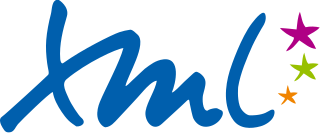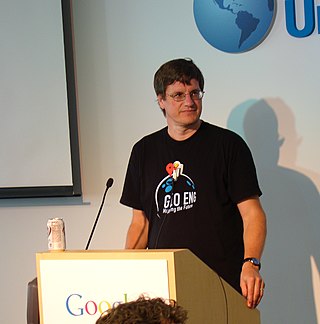
A markuplanguage is a text-encoding system which specifies the structure and formatting of a document and potentially the relationship between its parts. Markup can control the display of a document or enrich its content to facilitate automated processing.

The Standard Generalized Markup Language is a standard for defining generalized markup languages for documents. ISO 8879 Annex A.1 states that generalized markup is "based on two postulates":

Extensible Markup Language (XML) is a markup language and file format for storing, transmitting, and reconstructing arbitrary data. It defines a set of rules for encoding documents in a format that is both human-readable and machine-readable. The World Wide Web Consortium's XML 1.0 Specification of 1998 and several other related specifications—all of them free open standards—define XML.

In computing, a hyperlink, or simply a link, is a digital reference to data that the user can follow or be guided to by clicking or tapping. A hyperlink points to a whole document or to a specific element within a document. Hypertext is text with hyperlinks. The text that is linked from is known as anchor text. A software system that is used for viewing and creating hypertext is a hypertext system, and to create a hyperlink is to hyperlink. A user following hyperlinks is said to navigate or browse the hypertext.

RSS is a web feed that allows users and applications to access updates to websites in a standardized, computer-readable format. Subscribing to RSS feeds can allow a user to keep track of many different websites in a single news aggregator, which constantly monitor sites for new content, removing the need for the user to manually check them. News aggregators can be built into a browser, installed on a desktop computer, or installed on a mobile device.
The XML Metadata Interchange (XMI) is an Object Management Group (OMG) standard for exchanging metadata information via Extensible Markup Language (XML).
The Organization for the Advancement of Structured Information Standards is a nonprofit consortium that works on the development, convergence, and adoption of projects - both open standards and open source - for Computer security, blockchain, Internet of things (IoT), emergency management, cloud computing, legal data exchange, energy, content technologies, and other areas.
Xiph.Org Foundation is a nonprofit organization that produces free multimedia formats and software tools. It focuses on the Ogg family of formats, the most successful of which has been Vorbis, an open and freely licensed audio format and codec designed to compete with the patented WMA, MP3 and AAC. As of 2013, development work was focused on Daala, an open and patent-free video format and codec designed to compete with VP9 and the patented High Efficiency Video Coding.
An open file format is a file format for storing digital data, defined by an openly published specification usually maintained by a standards organization, and which can be used and implemented by anyone. An open file format is licensed with an open license. For example, an open format can be implemented by both proprietary and free and open-source software, using the typical software licenses used by each. In contrast to open file formats, closed file formats are considered trade secrets.
A voice browser is a software application that presents an interactive voice user interface to the user in a manner analogous to the functioning of a web browser interpreting Hypertext Markup Language (HTML). Dialog documents interpreted by voice browser are often encoded in standards-based markup languages, such as Voice Dialog Extensible Markup Language (VoiceXML), a standard by the World Wide Web Consortium.
Open XML Paper Specification is an open specification for a page description language and a fixed-document format. Microsoft developed it as the XML Paper Specification (XPS). In June 2009, Ecma International adopted it as international standard ECMA-388.
Office Open XML is a zipped, XML-based file format developed by Microsoft for representing spreadsheets, charts, presentations and word processing documents. Ecma International standardized the initial version as ECMA-376. ISO and IEC standardized later versions as ISO/IEC 29500.
Scribe is a markup language and word processing system that pioneered the use of descriptive markup. Scribe was revolutionary when it was proposed, because it involved for the first time a clean separation of presentation and content.

David R.R. Webber is an Information technologist specializing in applications of XML, ebXML and EDI to standards-based information exchanges. He is a senior member of the ACM since 2007. David Webber is one of the originators of the ebXML initiative for global electronic business via the internet. He is holder of two U.S. Patents for electronic information exchange transformation and those patents are now cited widely by 37 other patents. David Webber has implemented several unique groundbreaking computer solutions in his career including the world's first airport gate scheduling system , the SeeMail email client for MCIMail written in Prolog, the patented GoXML system for XMLGlobal, the ShroudIt obfuscation system for LNK Corp, and the VisualScript tool for Smartdraw Inc.
3DMLW is a discontinued open-source project, and a XML-based Markup Language for representing interactive 3D and 2D content on the World Wide Web.

Brian A McClendon is an American software executive, engineer, and inventor. He was a co-founder and angel investor in Keyhole, Inc., a geospatial data visualization company that was purchased by Google in 2004 to produce Google Earth. Keyhole itself was spun off from another company called Intrinsic Graphics, of which McClendon was also a co-founder. McClendon was elected a member of the National Academy of Engineering in 2015 for strategic, technical, and managerial leadership resulting in widespread accurate and useful geographic information.

Jean Paoli is one of the inventors of XML. Along with Tim Bray and C. Michael Sperberg-McQueen, Paoli co-edited the XML 1.0 recommendation for the World Wide Web Consortium starting in 1997 and until at least 2008.
Reed Technology and Information Services Inc. is a company that provides electronic content management services, engaging in data capture and conversion, preservation, analysis, e-submission and publication for corporate, legal and government clients. The company was founded in 1961 and is based in Horsham, Pennsylvania, with an additional office in Alexandria, Virginia.






